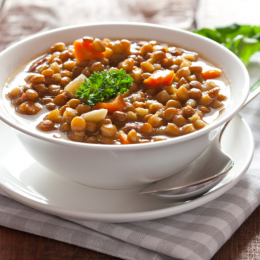7 Delicious Burgers That Are Healthy Too
No need to choose between taste and nutrition. Here’s how to have both.

Warm weather means grilling season, and it’s the burger’s time to shine. But what if you’re watching your cholesterol or don’t eat meat? Good news: There’s a burger for you, too.
“Burgers are versatile, easy to make, easy to eat—and yes, they can be healthy,” says Laura Cipullo, R.D., a dietitian in New York City. For meat lovers, the key is to choose leaner cuts. But you can actually make burgers out of many different ingredients. “Salmon, lentils, or even vegetables can serve as heart-healthy options,” she says.
Here, Cipullo breaks down the best bets for better-for-you burgers.
The Burger: Beef
Beef is a great source of iron and contains about 7 grams of protein per ounce. But beef can be high in calories and saturated fat, which can raise cholesterol levels and increase the risk for heart disease. The American Heart Association recommends limiting saturated fats to 5 to 6 percent of your total daily calories. So, for someone who eats 1,600 calories a day, that’s about 10.5 grams of saturated fat. For someone who eats 2,000 calories a day, that’s 13 grams of saturated fat.
Make it better: “The key is to choose at least 90 percent lean grass-fed beef,” Cipullo says. You’ll cut the saturated fat down to 5 grams or less per quarter-pound patty. “Grill the burger, and the remaining saturated fat can drip off.” Top your patty with plenty of vegetables—lettuce, tomato, onion—or pair with a side salad to round out your meal.
The Burger: Turkey
You might assume that turkey is always a better option than beef, but that not’s necessarily true. “Don’t be fooled,” Cipullo says. “If the turkey is dark meat, it may contain the same amount of saturated fat as the beef option.”
Make it better: “Look for at least 90 percent lean white turkey meat,” Cipullo says. Since lean ground turkey can be dry and plain, Cipullo recommends mixing other ingredients into your recipe. Diced bell peppers, onions, celery, seedless tomatoes, or tomato paste add moisture. “For the best flavor, add pressed garlic cloves,” she says. “You can also use fresh cilantro, parsley, dill, or any herb.” For a kick, try hot sauce, cayenne pepper, or diced fresh jalapeno.
The Burger: Bison
Bison’s a winner in Cipullo’s book. “I love bison burgers,” she says. “They have a delicious, deep flavor—I actually prefer bison to beef.” Most ground bison already has a slightly better nutritional profile than 90 percent lean ground beef: about 40 fewer calories, about 3 fewer grams of total fat, and less saturated fat for about the same amount of protein.
Make it better: Like with other ground meat, Cipullo recommends looking for at least 90 percent lean bison. For healthy toppings, you can always go with lettuce, tomato, or onion. But you may also want to try bolder options: spinach, grilled peppers, or avocado.
The Burger: Venison
“Venison burgers are extra lean and truly from a free-range farm: the wild,” Cipullo says. Venison, or deer meat, has fewer calories and less fat than 90 percent lean beef, but with all the protein and iron.
Make it better: Venison cooks faster than beef and can dry out, so keep a close eye. And if you’re new to venison, you may find it tastes gamey. Some venison fans prefer to season with a little salt and pepper—and not much else. Newbies may want to start with a marinade of lemon or tomato juice.
The Burger: Salmon
“Salmon burgers are a great way to get your omega-3 fatty acids,” Cipullo says. Omega-3s, often called good fats, are unsaturated fats that help protect the heart, brain, joints, and even skin. But if you’re buying ready-made patties, watch out for fakes. “Some boxes boast salmon, yet when reading the ingredients, you may find you have really purchased pollock burgers instead.”
Subscribe to our newsletter
It's quick and easy. You could be one of the 13 million people who are eligible.
Already a member? Click to discover our 15,000+ participating locations.
Follow Us
Make it better: “Ideally, the burger should be made from wild salmon, without added dyes, salts, or fillers,” Cipullo says. If you’re going the ready-made route, check the ingredient list specifically for salmon.
The Burger: Tuna
“Tuna is another great option to get omega-3 fatty acids,” Cipullo says. “Tuna burgers are delicious and lean.” The downside is that tuna—especially ahi, bigeye, and canned albacore tuna—can be high in mercury.
Make it better: Cipullo suggests playing it safe by eating tuna burgers just once or twice a month.
The Burger: Veggie
Veggie burgers are naturally low in calories. “But they’re also low in protein,” Cipullo says. Ready-made patties can be high in sodium and processed soy, too.
Make it better: The healthiest option is to make simple veggie burgers from scratch with beans or lentils for added protein. “Or pair your veggie-based burger with hummus and a slice of cheese to ensure you get at least 21 grams of protein, equivalent to about 3 ounces of chicken,” Cipullo says. For ready-made patties, make sure that veggies and beans are listed as the first ingredients, and check for less than 400 milligrams of sodium per burger.




